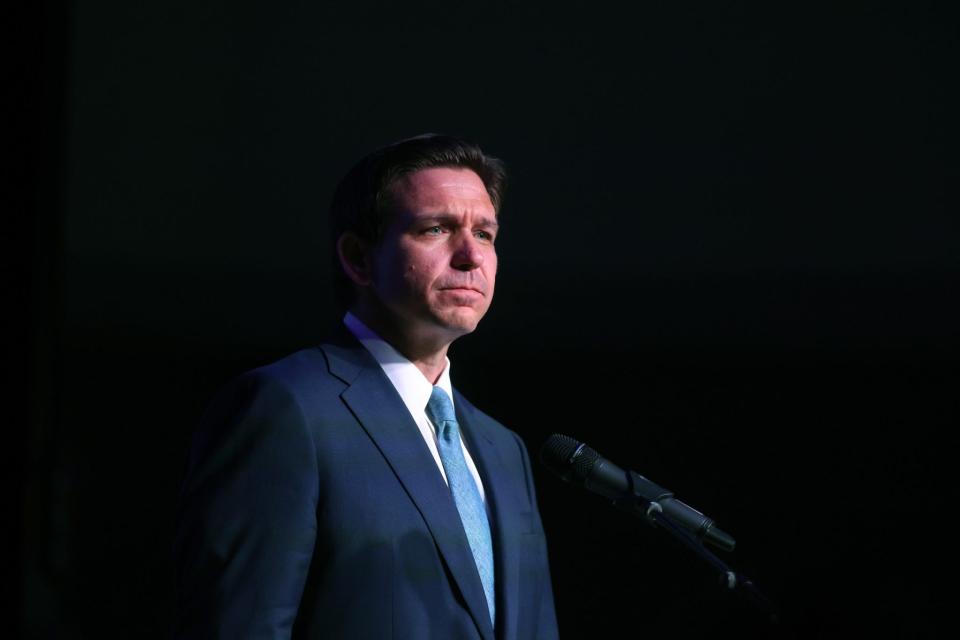What the ill-fated Ron DeSantis campaign and plant-based meat have in common, according to a marketing expert

In 2022, the question was asked whether Florida Governor Ron DeSantis is the future of the Republican Party. Less than a year and a half later, the answer, at least for now, is not quite. DeSantis's presidential campaign was a marketing failure, pure and simple. What went wrong with it makes for an edifying lesson for marketers everywhere.
After all, it clearly wasn’t policy where DeSantis fumbled. He was aligned with the Republican base on every key issue: immigration, abortion, and of course, the need to “smoke woke.”
However, in a primary election, and most general elections, people don’t vote for a checklist of policies, but for an emotionally constructed candidate entity. While Trump’s entity has been successfully built and fortified, DeSantis’s entity was largely “Trump without the drama.”
That’s marketing by subtraction–and it never works. Gluten-free only matters when the product is great. Plant-based meat is failing because the absence of meat is not an appealing proposition to enough people. What DeSantis and his advisors completely missed is that voters were still infatuated with what was subtracted.
However, most Republican voters actually like and enjoy the drama. It’s what they have come to expect from someone who was a reality TV show star and intuitively knows how to keep people on the edge of their seats, waiting to see who would be fired next after the commercial break.
Predictability is a disadvantage in the attention economy
Trump’s unpredictability is part of his superpower. Most people have boring jobs and live boring lives, so they look outside for stimulation. Trump gets this, and because he doesn’t have to filter his comments through layers of risk-averse advisors, he can deliver daily jolts that delight his base as they confound his opponents.
DeSantis, on the other hand, spoke robotically and in a deadly monotone. That’s how most brands speak, without dynamism or theatrical energy. Brands need to be performative to succeed in a social media world.
Don’t misunderstand me, I’m not saying that brands should take stands on culture war issues. Far from it. We know from the Dylan Mulvaney fiasco, where Bud Light lost billions because of a boycott, what that can lead to.
What I am saying is that to avoid boring your consumers into a state of non-apprehension–and we are in a battle for attention, after all–brands need to master the art of the unexpected. That includes how they speak. Avoid the trap of the DeSantis monotone, where every email, every social post, is at best slightly different from the previous one.
Brand collaborations and the unpredictable juxtapositions they represent are also bold ways to escape from the curse of repetition. Even when it might feel gimmicky and short-term, you are creating what researchers call “neural substrates of brand love.”
Don’t be afraid of emotion
We hear brands talk about making an emotional connection with consumers all the time. But the DeSantis campaign didn’t get the message, it was largely bereft of emotion. It failed to appeal to the reptilian brain, which is why he and his PACs spent $35 million on the Iowa campaign–the equivalent of $1,497 per voter–and came up dry.
Given that his message was Trump’s policies without the drama, the boring, drama-free advertising was a self-fulfilling prophecy of disaster.
By contrast, Trump lives and feeds on raw emotion. Everyone who has ever seen one of his rallies understands the chords, nerves, and shared harmonies he is strumming. The connections are electric. You need to reveal and display emotion to create reciprocity. Put out–and you'll get back.
There’s a reason that many brands are typically free of feeling–marketers often fail to infuse their brands with emotional power and direct appeals to our primal urges. Like the DeSantis campaign, they focus on function, not emotion. In fact, they often fear drama and emotion, even though research shows that emotion triggers dopamine and creates memories.
So as DeSantis returns to the Sunshine State, let his calamitous campaign enlighten your brand marketing strategies.
Adam Hanft, the CEO of Hanft Ideas, is a widely respected brand strategist who advises global leaders, Fortune 500 companies, and the world’s most innovative startups.
More must-read commentary published by Fortune:
‘Parroting Putin’s propaganda’: The business exodus over Ukraine was no Russian bonanza
WEF president: ‘It’s time to revitalize trade—and reverse the trend of Slowbalization’
The anti-DEI movement has gone from fringe to mainstream. Here’s what that means for corporate America
Legendary CEO James Keyes: Here’s how I saved 7-Eleven–and why I couldn’t save Blockbuster
The opinions expressed in Fortune.com commentary pieces are solely the views of their authors and do not necessarily reflect the opinions and beliefs of Fortune.
This story was originally featured on Fortune.com

 Yahoo Finance
Yahoo Finance 